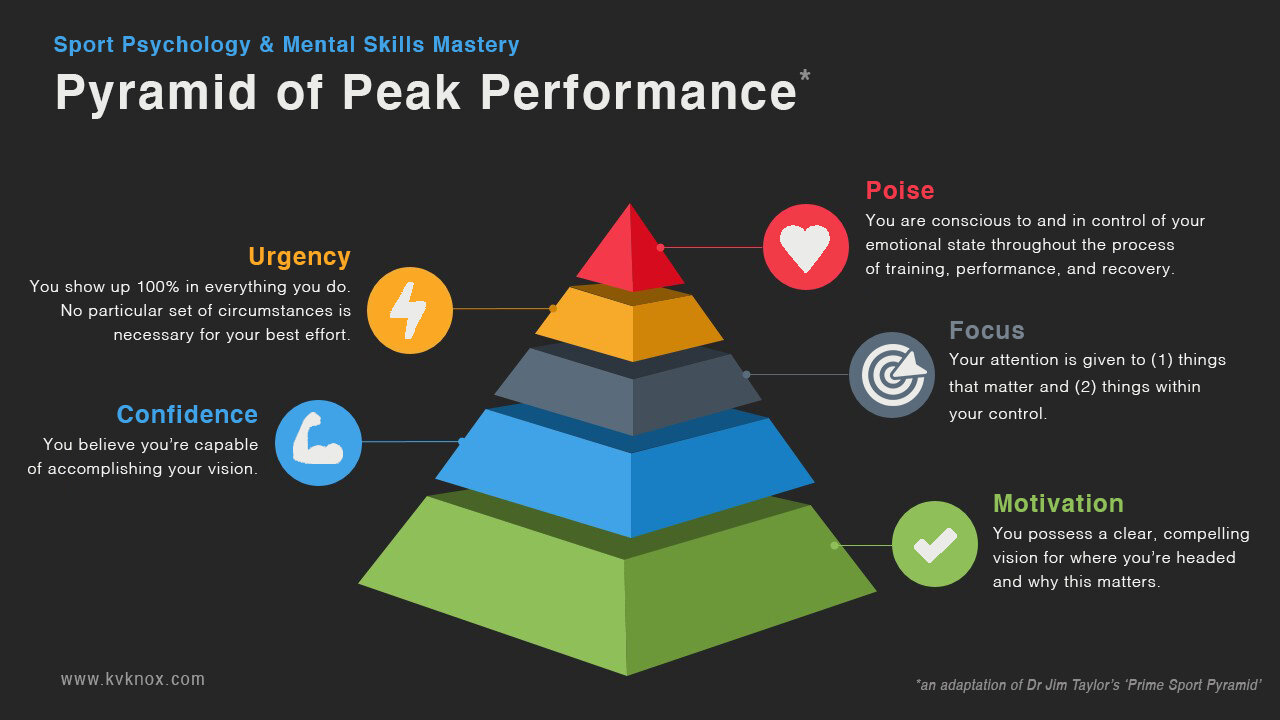Foundations of Mastery & Peak Performance
Baseline athletes need only a level one or level two degree of skill to realize moderate performance. The higher you work up the pyramid, the greater your capacity for elite levels of performance.
Overview
High achievement in a given field is the result of two things: (1) mastery of a specific set of tasks and (2) psychological & social support toward that end. The vitae for this course involves at least 5 domains: motivation, confidence, focus, urgency, and poise. This course explores these themes and aims to help you develop your own path to mastery gains and consistent high performance.
Objectives
+ Gain a clear vision for yourself, your field of interest, and/or your craft.
+ Adopt a practice of self-belief and decisive action relevant to your stated vision & goals.
+ Better understand your attentional capacities, biases, and replenishment.
+ Develop the skills of focus, mental discipline, and presence.
+ Learn to invest your time & steward your energy toward your vision.
+ Develop a baseline mastery of emotional intelligence.
Concepts
+ Motivation — You possess a clear, compelling vision for where you’re headed and why this matters. Most people don’t lack motivation, they lack clarity. If you desire more motivation, get a clearer vision--know your ‘why.’
+ Confidence — You believe you’re capable of realizing your vision. If you lack confidence, decisive action is your friend. Decision, practice, repetition, refinement, and courageous action lead to confidence.
+ Focus — Your attention is given to: (1) that which matters, and (2) that which is in your control. Focus includes credible self-talk, a positive mindset, preparedness, and owning the moment.
+ Urgency — You show up 100% in everything you do. No particular set of circumstances is required for you to bring high levels of intensity and determination. A sense of urgency comes from greater focus, an understanding of kairos time, and a competitive spirit.
+ Poise — You are conscious to and in control of your emotions, no matter the circumstance. In training, performance, and recovery, you exhibit self-control and emotional stability. Emotional maturity is facilitated by first, impulse control, and later, personal and interpersonal consciousness.
Resources (not exhaustive)
+ Flow: The Psychology of Optimal Experience (Mihaly Csikszentmihalyi)
+ Mindset (Carol Dweck)
+ Peak Performance: Elevate Your Game, Avoid Burnout, and Thrive with the New Science of Success (Brad Stulberg and Steve Magness)
+ The Power of Full Engagement (Dr. Jim Loehr)
+ What Drives Winning (Brad Ledbetter)
+ White Bears and Other Unwanted Thoughts: Suppression, Obsession, and the Psychology of Mental Control (Daniel Wegner)
+ “A Better Information Diet” (https://www.edbatista.com/2019/05/a-better-information-diet.html) (Ed Batista)
+ “Embracing Stress Is More Important Than Reducing Stress” (https://news.stanford.edu/news/2015/may/stress-embrace-mcgonigal-050715.html) (Clifton Parker)
+ “Fixed vs Growth: The Two Basic Mindsets That Shape Our Lives” (https://www.brainpickings.org/2014/01/29/carol-dweck-mindset) (Maria Popova)
